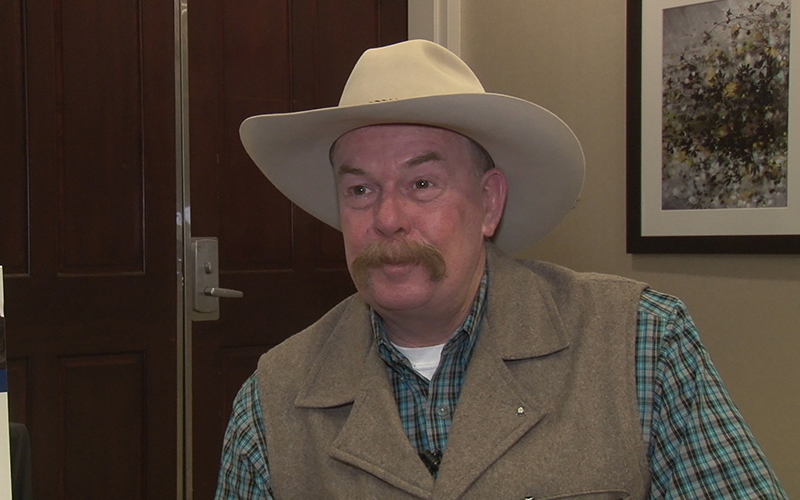
While some groups are criticizing the Trump administration’s call for a border wall as costly and counterproductive, Yuma County Sheriff Leon Wilmot said the wall that went up in his county along the border with Mexico has worked well. (Photo by Tyler Fingert/Cronkite News)
WASHINGTON – One day before the new secretary of Homeland Security was scheduled to testify on border security, a Nogales business owner joined critics speaking out Monday against the Trump administration’s plans to continue the “militarization” of the southern border.
John Anthony Sedgwick was one of several speakers from the Southern Border Communities Coalition who said President Donald Trump’s pledge to build a wall that runs the length of the U.S.-Mexico border would be “tremendously harmful,” in both an economic and humanitarian sense.
“The folks that are coming in the U.S. now are coming for humanitarian reasons, they’re fleeing from violence,” Sedgwick said on a coalition conference call Monday. “These guys are not walking across the countryside. The Mexican folks that were looking for work have primarily gone in the other direction, they’re going home.”
But Yuma County Sheriff Leon Wilmot, who lives on another stretch of Arizona border that already has a wall, said it has been a positive as far as he’s concerned.
“The border fence in our community, in our geographic location has proven to work,” Wilmot said. “After the fence went in, our deaths in the desert, our rapes and robberies were reduced by 90 percent at least.”
Wilmot said a border barrier could take several forms, not just a physical barrier. He said he could not speak for how a wall might work in other areas of the border but in his county, he said, it has worked. And if a fence can save even one person’s life it would be beneficial, he added.
Wilmot spoke after a meeting of the National Sheriff’s Association in Washington, which met Monday morning with Homeland Security Secretary John Kelly. Wilmot said he was optimistic after the meeting, and believes Kelly will listen to the needs of departments like his.
Both Kelly and Wilmot are scheduled to testify Tuesday to the House Homeland Security Committee on a hearing “to examine the gaps in our security at the southern border and what we need to put us on a path to security.”
What we don’t need to do, in Sedgwick’s mind, is build more wall. He said the one there now is sufficient and investing any more is a waste of money.
-Cronkite News video by Tyler Fingert
Sedgwick, who described himself as a “lifetime Republican” who did not vote for Trump, said his land is already being affected by recent changes to border security. He said the government has installed towers on his property that use “much higher levels of radiation, much more complex systems that are actually quite dangerous to human health,” in addition to being able to monitor anyone who lives there.
“They have essentially made the rest of my property usable only for cows,” Sedgwick said. “Cows don’t care if you look at them, so they’re happy, but anybody building a house within three or four miles on my property would have to be aware that the federal government could look through it.”
Sedgwick said he also worries that tighter security will have an economic impact in towns on both sides of the border. He said he has already seen a drop in Mexicans shopping in the U.S., causing shops to close and joblessness to go up.
He fears that will only get worse if Trump follows through on a campaign pledge to do away with the North American Free Trade Agreement. That could lead to the shuttering of assembly plants on the Mexican side of the border that leave huge numbers unemployed “only 5 or 10 miles away from the U.S. border.”
Andrea Guerrero, the co-chair of the Southern Border Communities Coalition, agreed with Sedgwick that more wall is unnecessary because border regions are already some of the safest in the country.
“We already have a border wall, we have a triple wall in many places, including where I am in San Diego,” said Guerrero, who is also executive director of Alliance San Diego.
She also pointed to what she said were 20,000 Customs and Border Protection agents along the border and at ports of entry and worried that they already have the authority to stop vehicles and question people as far as 100 miles from the border.
“We are concerned about the ongoing lack of accountability and transparency and oversight at CBP,” Guerrero said.